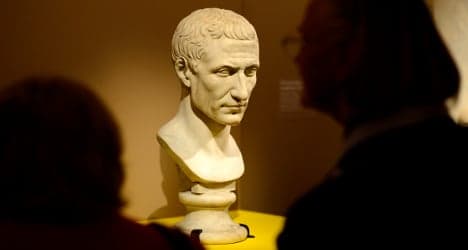Caesar did not suffer from epilepsy: scientists

Scientists from Imperial College London have released new research arguing that Roman general Julius Caesar suffered from mini-strokes, going against previous diagnoses of epilepsy.
More than 2,000 years since Caesar died - assassinated by his own senators - researchers have claimed the military leader was struck by a debilitating disease in later life.
Some academics have previously argued that Caesar suffered from epilepsy, a brain condition which causes seizures.
But writing in the journal Neurological Sciences, researchers Francesco M. Galassi and Hutan Ashrafian have argued that the general suffered from cerebrovascular disease.
The result was a series of mini-strokes, well documented in classical sources, Galassi told The Local.
“His symptoms included headaches, sensory deficit, syncopal episodes (fainting), vertigo. There was a famous occasion when he could not stand up in the Senate to honour the senators,” said Galassi, who is currently researching the history of medicine at Imperial College London’s Department of Surgery and Cancer.
In addition to the dramatic impact of his poor health, in the article the scientists argue that Caesar’s personality changed as a result of cerebrovascular disease.
“As he was depressed towards the end of his life, one could perhaps speculate that the people who plotted against him might have noticed this.
“You cannot exclude that changes in his mood might have encouraged those around him to take action, although this must be said with caution,” Galassi commented.
Caesar was stabbed to death on the Ides of March (15th) 44BC by a group of senators who conspired against him.
While the Roman general came to a violent end, in their research the scientists note the sudden deaths of two relatives could provide a clue to Caesar’s health.
“In order to explain that he had late onset epilepsy, other researchers have used the fact that his two ancestors died from Sudep (sudden unexpected death in epilepsy), which is very rare and too complex,” Galassi said, arguing that a family history of cardiovascular was a much simpler explanation.
Rather than a misdiagnosis when Caesar was alive, Galassi said classical references to epilepsy and its symptoms may have been part of a “propaganda drive” on the part of his supporters.
“In the ancient world epilepsy was regarded as a sacred disease; people who suffered from epilepsy were thought as having a direct connection with the gods,” he said.
Centuries after Caesar’s death, he is still celebrated as one of the most significant figures in Roman history.
But Galassi warns against putting the general on a stone pedestal: “I think medicine plays an important role in history, we should all look at these characters as humans not marble statues.”
Comments
See Also
More than 2,000 years since Caesar died - assassinated by his own senators - researchers have claimed the military leader was struck by a debilitating disease in later life.
Some academics have previously argued that Caesar suffered from epilepsy, a brain condition which causes seizures.
But writing in the journal Neurological Sciences, researchers Francesco M. Galassi and Hutan Ashrafian have argued that the general suffered from cerebrovascular disease.
The result was a series of mini-strokes, well documented in classical sources, Galassi told The Local.
“His symptoms included headaches, sensory deficit, syncopal episodes (fainting), vertigo. There was a famous occasion when he could not stand up in the Senate to honour the senators,” said Galassi, who is currently researching the history of medicine at Imperial College London’s Department of Surgery and Cancer.
In addition to the dramatic impact of his poor health, in the article the scientists argue that Caesar’s personality changed as a result of cerebrovascular disease.
“As he was depressed towards the end of his life, one could perhaps speculate that the people who plotted against him might have noticed this.
“You cannot exclude that changes in his mood might have encouraged those around him to take action, although this must be said with caution,” Galassi commented.
Caesar was stabbed to death on the Ides of March (15th) 44BC by a group of senators who conspired against him.
While the Roman general came to a violent end, in their research the scientists note the sudden deaths of two relatives could provide a clue to Caesar’s health.
“In order to explain that he had late onset epilepsy, other researchers have used the fact that his two ancestors died from Sudep (sudden unexpected death in epilepsy), which is very rare and too complex,” Galassi said, arguing that a family history of cardiovascular was a much simpler explanation.
Rather than a misdiagnosis when Caesar was alive, Galassi said classical references to epilepsy and its symptoms may have been part of a “propaganda drive” on the part of his supporters.
“In the ancient world epilepsy was regarded as a sacred disease; people who suffered from epilepsy were thought as having a direct connection with the gods,” he said.
Centuries after Caesar’s death, he is still celebrated as one of the most significant figures in Roman history.
But Galassi warns against putting the general on a stone pedestal: “I think medicine plays an important role in history, we should all look at these characters as humans not marble statues.”
Join the conversation in our comments section below. Share your own views and experience and if you have a question or suggestion for our journalists then email us at [email protected].
Please keep comments civil, constructive and on topic – and make sure to read our terms of use before getting involved.
Please log in here to leave a comment.